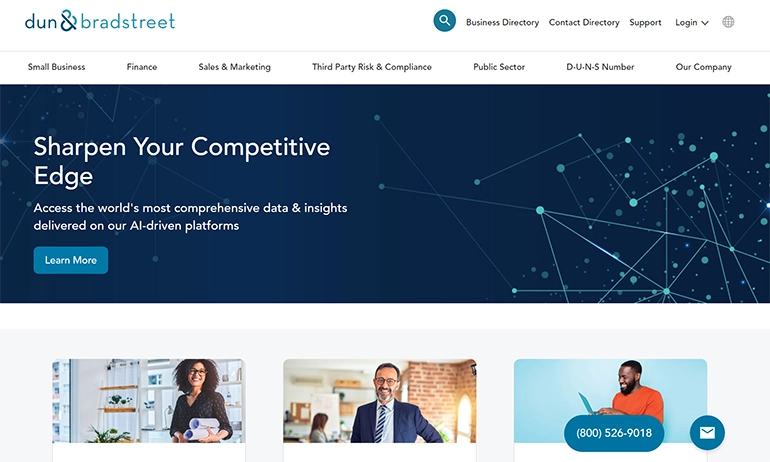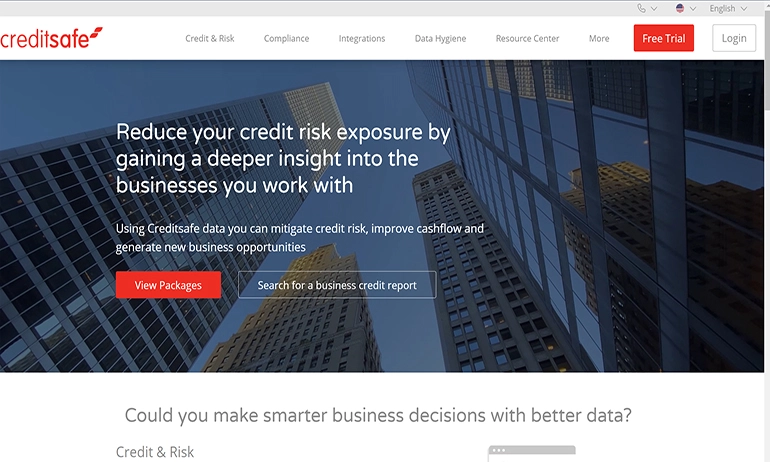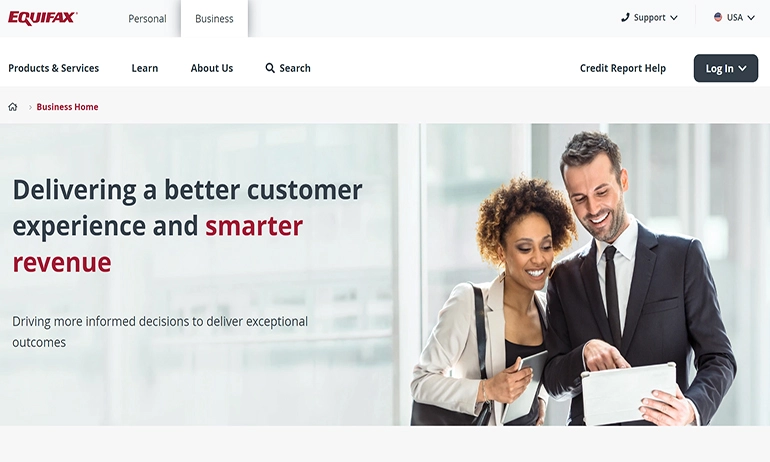Guide to Business Credit Bureaus: Check & Improve Scores
Author: Chandra Dhopatkar
Published: 01/05/2024 7:13 a.m. EST
Last Update: 03/04/2024 6:55 p.m. EST
Edited by: Jennifer Bonilla
Research business credit bureaus. Then, analyze their role in evaluating business creditworthiness.

Business credit reporting agencies are vital in evaluating a company’s financial health, particularly for small businesses and startups that’ve undergone a legal business formation setup.
These bureaus collect data on business credit history, including credit usage, payment histories, and legal filings, to generate comprehensive credit reports.
Understanding, checking, and managing this information is crucial for businesses to ensure accuracy, improve commercial credit scores, and secure better credit terms.
Regular monitoring and responsible credit management are key to a business’s financial success and growth opportunities.
Understanding Business Credit Bureaus
Understanding how major business credit reporting agencies work is crucial for entrepreneurs and business owners, as these bureaus significantly influence a company’s credit standing and financial reputation.
What Are Business Credit Bureaus?
Business credit bureaus are specialized agencies that compile financial data and create credit profiles for businesses. These bureaus, such as Equifax Business Credit, Experian Business Credit, and others, are integral in the financial world. They differ from personal credit bureaus in that they focus solely on collecting and analyzing data related to businesses.
Unlike personal credit reports, which are mostly uniform, business credit reports can vary significantly from one bureau to another. The three major business credit bureaus – Equifax, Experian, and Dun & Bradstreet – each have their unique methodologies and data sources. This variation means that the same business can have different credit scores with different bureaus.
Components of a Business Credit Report
A business credit report typically includes a variety of business information, such as the company’s credit risk score, credit limit, and payment history. These reports are crucial for entities considering extending a business loan or lines of credit as they help assess the credit risk associated with the business.
Key components of a business credit report include:
- Financial information: Revenue, profits, and other financial data.
- Credit data: Details of current and past credit arrangements, including business credit cards and trade credit / net-30 accounts.
- Business credit information: Company’s credit history and any instances of business failure or late payments.
- Credit file: A record of the business’s credit activities and credit profile.
Credit reports include information about a business’s financial behavior and the likelihood of a business failing, which is crucial for creditors. Credit monitoring services like those offered by Equifax Business Credit Reports and Experian Business Credit Reports provide businesses with regular updates on their credit status, helping them maintain a healthy business credit profile.
Understanding the nuances of these reports and the role of commercial credit reporting agencies is essential for any small business owner or credit expert. It’s important to check your business credit report regularly to ensure accuracy and to identify areas for improvement in their credit practices.
Checking Your Business Credit
Regularly checking your business credit through reports from credit reporting agencies like Equifax, Experian, and Dun & Bradstreet is essential for maintaining a healthy credit score and understanding your company’s financial position in the marketplace.

How to Access Business Credit Reports
Accessing your business credit report is a key step in understanding your company’s financial standing. Major business credit reporting agencies such as Dun & Bradstreet, Equifax Business Credit, and Experian Business Credit offer detailed reports.
Businesses can obtain these reports, often for a fee, but there are also options for free business credit reports. It’s important to regularly check these reports to stay informed about your business’s credit health.
To access your reports:
- Contact the credit bureaus directly. Each bureau has its process for requesting a report.
- Consider signing up for credit monitoring services, which can provide regular updates and alerts about changes in your credit status.
- Look for free business credit options, as some platforms offer basic reports at no cost.
Remember, you may need to register your business with these bureaus to start receiving credit information.
Interpreting Business Credit Reports and Scores
Understanding your business credit score and report is crucial in managing your company’s financial health. Credit scores and reports from Equifax Business Credit Reports, Bradstreet Credit Reports, and Experian Business Credit Reports provide a comprehensive view of your business’s creditworthiness.
When interpreting these reports:
- Review your credit information thoroughly, including payment history, credit limits, and available credit.
- Compare your scores across the three main business credit bureaus to get a complete picture. Each bureau may have different information, affecting your overall score.
- Understand that these reports influence how lenders, suppliers, and other stakeholders view your credit risk score and overall business credit risk score.
- Be aware of your small business risk score if you are a small business owner. This score can significantly impact your ability to secure small business loans and other financing options.
By regularly checking and understanding your business credit reports and scores from these major bureaus, you can better manage your credit profile and make informed decisions for your business’s financial future.
Managing Your Business Credit
Managing your business credit effectively involves regularly reviewing reports from business credit bureaus like Equifax and Experian, ensuring accurate credit information, and utilizing tools like credit monitoring services to maintain a strong financial standing in the commercial sphere.

Monitoring and Disputing Errors on Credit Reports
Regularly monitoring your business credit is crucial in maintaining an accurate credit profile. This involves routinely checking credit reports from major business credit bureaus and credit reporting agencies. By doing so, you can quickly identify and address any inaccuracies or errors.
To effectively dispute errors:
- Regularly obtain reports from business credit reporting agencies like Equifax, Experian, and Dun & Bradstreet.
- Review these reports meticulously for any discrepancies in credit information or financial information.
- Contact the respective credit bureau immediately to correct any inaccuracies, providing the necessary documentation to support your claim.
- Consider using credit monitoring services for real-time alerts and updates on your credit status.
Building a Strong Business Credit History
Developing a robust business credit score involves a series of strategic actions over time. A strong credit history not only enhances your ability to obtain favorable terms on loans and credit lines but also boosts your company’s reputation in the business community.
Key strategies include:
- Ensuring timely payments to creditors to establish a history of reliability.
- Maintaining low credit utilization ratios to show responsible credit management.
- Applying for and responsibly using business credit cards to build a credit history.
- Working with suppliers who report payments to credit bureaus, thus contributing positively to your business credit report.
- Regularly review and update your business information with the credit reporting bureaus to ensure it reflects your current financial situation accurately.
By attentively managing and building your business credit, you position your enterprise for sustainable growth and better financial opportunities in the future.
Improving Business Credit Scores
Improving business credit scores involves strategic actions with business credit agencies sometimes called commercial credit bureaus.
Focusing on accurate credit information and utilizing resources like free credit reports and credit monitoring services can help enhance your company’s financial profile.
Practices for Enhancing Your Business Credit Score
Improving your business credit score is a strategic process that involves several best practices. Key to this is understanding how credit reporting agencies contribute to your score and utilizing their services effectively.
- Pay bills on time: Consistently paying creditors punctually is fundamental in boosting your score.
- Manage credit utilization: Keeping your credit balances low compared to your credit limits demonstrates responsible credit management.
- Update business information: Regularly provide updated information about your business to credit bureaus, ensuring they have the most current data.
- Diversify credit types: Utilize different types of credit, like business credit cards and lines of credit, to show a well-rounded credit profile.
The Role of Credit Reporting Agencies in Score Improvement
Credit reporting agencies like Equifax Small Business and Experian Business Credit Score services play a crucial role in determining your business credit score. They collect and analyze your credit information, which influences your credit ratings.
- Regularly check credit reports: Obtain and review your credit reports from agencies like Equifax Business Credit Scores and Bradstreet Credit Scores to understand your current standing.
- Utilize credit monitoring services: Services from agencies like Experian and Equifax provide insights and alerts on your credit status, helping you stay informed.
- Correct inaccuracies: Dispute any errors in your credit reports promptly under the Fair Credit Reporting Act, as inaccuracies can negatively impact your score.
- Engage with credit experts: Consult with credit experts or use global credit services for professional advice on improving your credit score.
By actively engaging with these practices and understanding the role of credit agencies, businesses can significantly improve their credit scores, enhancing their financial opportunities and credibility in the marketplace.
Improving Business Credit Scores
Improving business credit scores is vital for many businesses, especially when seeking financial products or services. By understanding how business credit bureaus collect and report information about a business, companies can take proactive steps to enhance their creditworthiness.

Utilizing resources like Creditsafe business credit reports or the Small Business Scoring Service helps businesses monitor their credit health and make informed decisions to improve their scores. This process is essential for maintaining a positive credit profile in 2025.
Practices for Enhancing Your Business Credit Score
To improve your business credit scores, it’s essential to adopt several best practices:
- Pay Bills Timely: Ensure your business pays all bills on time. Timely payments significantly impact credit scores.
- Manage Debt Wisely: Keep debt levels manageable relative to your business’s income. High debt can lower credit scores.
- Monitor Credit Reports: Regularly check the credit reports from major business credit bureaus to identify and correct any inaccuracies.
The Role of Credit Reporting Agencies in Score Improvement
Credit reporting agencies play a vital role in business credit scoring. Agencies like Dun & Bradstreet, Equifax, and Experian generate business credit reports that reflect your business’s financial reliability.
- Utilize Their Services: Engage with agencies for business credit monitoring to keep track of your credit status.
- Understand Their Reporting: Know how these agencies collect and report credit information on approximately your business transactions.
- Leverage Their Insights: Use the credit scores and ratings provided by these agencies to guide your credit improvement strategies.

These agencies, by providing detailed insights and reports, help in shaping the creditworthiness perception of your business in the market.
Navigating Small Business Credit
Navigating Small Business Credit involves understanding the intricacies of how credit works for smaller enterprises. By exploring various tools and strategies, small business owners can effectively build and manage their credit, laying a strong foundation for financial growth and stability.
Small Business Credit Challenges and Solutions
Small businesses often face unique challenges in building credit, such as limited financial history and difficulties in accessing traditional credit sources. This can result in a lower business failure score, making it harder to secure funding.
Solutions include:
- Utilizing Creditsafe business credit reports to understand credit standings.
- Engaging with many business credit bureaus that offer tailored services for small businesses.
- Participating in the Small Business Financial Exchange for better credit data sharing.
- Exploring credit reports for free options to regularly monitor and manage credit.
- Seeking advice from mercantile commercial credit experts to navigate credit-building strategies.
These solutions can help small businesses overcome credit hurdles, ensuring better access to necessary financial resources.
Business Credit Bureaus and Your Business
In the realm of business finance, business credit bureaus and your business are interlinked, with bureaus playing a critical role in shaping credit perceptions. These bureaus, including the three business credit giants – Equifax, Experian, and Dun & Bradstreet, collect information and generate business credit reports. Their reports are pivotal for businesses seeking to establish and maintain creditworthiness, as they provide essential data for creditors and lenders, thereby providing business credit opportunities and insights.
Choosing the Right Credit Bureau for Your Business
Selecting the right credit bureau is crucial for businesses looking to manage and improve their credit profiles. Each of the three major business credit bureaus – Equifax, Experian, and Dun & Bradstreet – offers unique services and has different strengths.
- Equifax: Provides comprehensive credit reports, including financial transactions and payment histories, beneficial for businesses seeking detailed credit analysis.
- Experian: Known for its extensive database, offering detailed consumer and commercial credit information.
- Dun & Bradstreet: Specializes in credit scoring and reporting for businesses, ideal for companies needing in-depth business credit assessments.
Consider your specific needs, such as the type of credit information required or the industries covered, when choosing a bureau. Each bureau collects varied information, so a comparative approach will help you determine which one aligns best with your business’s credit goals.
Exploring Other Business Credit Bureaus
After you establish business credit with the three major bureaus, there are several other credit reporting agencies each with its unique focus and offerings.
Agencies like Ansonia and Cortera provide industry-specific reports, making them ideal for businesses in niche markets. The business credit bureau Credit.net offers comprehensive data on U.S. and Canadian businesses, which is beneficial for companies operating in North America. Creditsafe extends its reach globally with a massive database of businesses worldwide.
For industry-specific needs, agencies like LexisNexis Accurint, with its Small Business Risk Score, a financial stability risk score, and Lumbermen Credit Reporting Group, focusing on construction and mercantile commercial credit, are valuable resources.
The National Association of Credit Management provides tradelines from various industry credit groups, useful for diverse business insights.
Each business credit reporting agency offers unique perspectives and data, making them suitable for different business requirements. Whether you need global coverage, industry-specific reports, or insights into small business credit, these bureaus provide a wealth of information.
When choosing a credit bureau, consider the specific type of credit information and reporting style that aligns with your business needs.
List of Business Credit Reporting Agencies
We’ve compiled a table of all the business credit bureaus that collect information. These bureaus collect information and each offers credit reports similar to consumer credit reports but for any business with business credit.
We recommend starting with one of the major business credit agencies (Dun & Bradstreet, Equifax Small Business, Experian Commercial) before reaching out to some of the lesser-known agencies on this list.
Contact these business credit agencies to retrieve your business credit reports:
Each bureau caters to different business needs and industries, offering a range of credit reporting services.
FAQ
What are business credit bureaus?
Business credit bureaus are agencies that collect and maintain credit information on businesses. They provide credit reports and scores to help lenders and other businesses assess the creditworthiness of a company.
How can I obtain a business credit report from Equifax?
You can obtain a business credit report from Equifax by contacting them directly or by using their online services. They provide detailed information on a company’s credit history, including payment history, credit utilization, and public records.
What does Experian business credit score indicate?
An Experian business credit score indicates the creditworthiness of a company. It is based on the company’s credit history, payment behavior, and other financial data. A higher score signifies lower credit risk.
Are there free business credit reports available?
Yes, some business credit bureaus offer free business credit reports. These reports may have limitations but can still provide valuable insights into a company’s credit standing.
What type of credit information is included in a business credit report?
A business credit report includes information such as payment history, credit utilization, public records, trade experiences, and credit inquiries related to the company’s credit activity.
How do Equifax business credit scores differ from Experian business credit scores?
Equifax and Experian business credit scores may differ based on their respective scoring models and the credit data they use. It’s essential to review both scores for a comprehensive understanding of a company’s creditworthiness.
Can I access Dun & Bradstreet credit reports through business credit bureaus?
Yes, business credit bureaus like Equifax and Experian provide access to Dun & Bradstreet credit reports. These reports include information on a company’s credit history and can be valuable for assessing credit risk.
What are the benefits of monitoring business credit scores and reports?
Monitoring business credit scores and reports helps companies track their credit health, detect any errors or discrepancies, and address potential issues that could impact their ability to obtain financing or secure favorable payment terms.
How can I improve my business credit score?
You can improve your business credit score by making timely payments, keeping credit utilization low, managing trade experiences effectively, and monitoring your credit reports for errors or inaccuracies.
What does Creditsafe business credit reports include?
Creditsafe business credit reports include comprehensive credit information such as payment history, credit limits, public records, company financials, and credit scores for assessing the creditworthiness of a business.

Chandra, founder of “Build Business Credit in 30 Days,” specializes in increasing business valuations by helping companies build strong business credit.